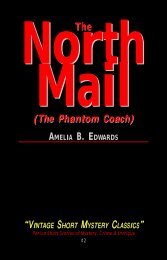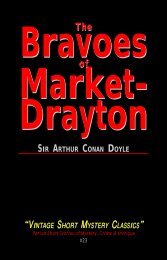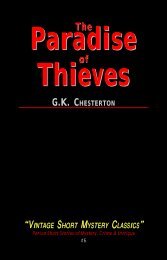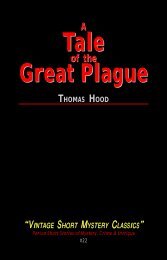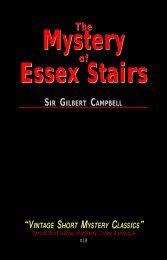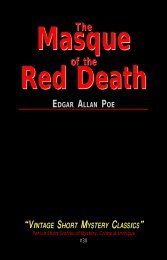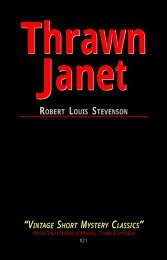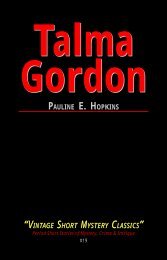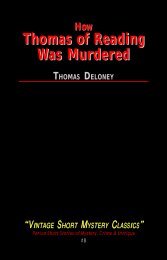The Confessed Crime - Hornpipe Vintage Publications
The Confessed Crime - Hornpipe Vintage Publications
The Confessed Crime - Hornpipe Vintage Publications
You also want an ePaper? Increase the reach of your titles
YUMPU automatically turns print PDFs into web optimized ePapers that Google loves.
<strong>The</strong><br />
<strong>Confessed</strong><br />
<strong>Crime</strong><br />
LEO TOLSTOI<br />
“VINTAGE SHORT MYSTERY CLASSICS”<br />
Period Short Stories of Mystery, <strong>Crime</strong> & Intrigue<br />
#1
All short stories in the “<strong>Vintage</strong> Short Mystery Classics” series are<br />
period works now in the public domain. <strong>The</strong>se e-book presentations<br />
are published by:<br />
<strong>Hornpipe</strong> <strong>Vintage</strong> <strong>Publications</strong><br />
P.O. Box 18428<br />
Spartanburg, SC 29318<br />
www.hornpipe.com/mysclas.htm<br />
“<strong>Vintage</strong> Short Mystery Classics” have been selected by Daniel Elton<br />
Harmon, author of “<strong>The</strong> Harper Chronicles,” with the intent of introducing<br />
new readers to notable works of short historical fiction in<br />
the mystery/gothic/crime vein. For more information, please visit the<br />
author’s Web site at www.danieleltonharmon.com.<br />
We generally do not regard Leo Tolstoi (1828-1910) as a writer<br />
of crime or mystery fiction. His often was a gentle pen recounting<br />
parables of peasant folk. A veteran of the <strong>Crime</strong>an War, Tolstoi also<br />
wrote of soldiers and sinners at different levels of society. He is best<br />
known, of course, for his great novels War and Peace and Anna<br />
Karenina, as well as shorter works including <strong>The</strong> Cossacks<br />
and <strong>The</strong> Death of Ivan Ilyitch.<br />
Much of Tolstoi’s writing bears the stamp of strong Christian influences.<br />
Tolstoi came to embrace particularly the principles of brotherly love,<br />
patient acceptance in the face of evil and, as exemplified in “<strong>The</strong><br />
<strong>Confessed</strong> <strong>Crime</strong>,” forgiveness.<br />
—DEH
<strong>The</strong> <strong>Confessed</strong> <strong>Crime</strong><br />
In the town of Vladimir there lived a young merchant<br />
named Aksenoff, who possessed two shops and a house.<br />
In person Aksenoff was ruddy, curly-haired, and<br />
altogether handsome. Moreover, he was a singer and wit<br />
of the first order. From his youth upward he had been<br />
given to drinking habits, and, when drunk, to brawling;<br />
yet, as soon as ever he married, he foreswore liquor, and<br />
only occasionally broke out in that direction.<br />
One summer he was taking leave of his family before<br />
setting out for the fair at Nizhny, when his wife said to<br />
him:<br />
“Ivan Dmitrievitch, do not go today. I had such an<br />
evil dram about you last night.”<br />
But Aksenoff laughed and said:<br />
“Are you afraid, then, that I am going to make too<br />
merry at the fair?”<br />
“Nay,” she replied, “I hardly know what it is I am<br />
afraid of. Only, I saw such a dreadful thing in my dream!<br />
You were coming home from the town, and as you lifted<br />
your cap I could see that your hair had turned grey!”<br />
Aksenoff laughed again.<br />
“So much the better,” he said. “See now if I don’t<br />
drive some prudent bargains there, and bring you home<br />
some valuable presents.”<br />
And he kissed his family and departed. Half-way on<br />
the road he fell in with another merchant of his acquaintance,<br />
and they stopped to spend the night together at an<br />
inn. <strong>The</strong>y drank tea, and then went to bed in adjoining
2 <strong>The</strong> <strong>Confessed</strong> <strong>Crime</strong><br />
rooms. Aksenoff, who was anything but a stay-abed, awoke<br />
in the middle of the night, and, since traveling was<br />
pleasanter while it was cool, aroused the ostler, and told<br />
him to put his horse in. <strong>The</strong>n he went into the office,<br />
settled up with the landlord, and departed.<br />
After going about forty versts he stopped to bait his<br />
horse, and, having refreshed himself with a sleep in the<br />
lodge of the inn-yard, went indoors to dine on the verandah.<br />
He ordered a samovar of tea, laid hands upon a guitar,<br />
and proceeded to play it. Suddenly a troika hung with<br />
bells drove into the courtyard, and from the body of it<br />
alighted a tchinovnik and two soldiers. <strong>The</strong> man walked<br />
up to Aksenoff and asked him who he was and where he<br />
had come from, to which queries Aksenoff duly replied,<br />
and then inquired, in his turn, if the tchinovnik would<br />
care to join him in a samovar of tea. <strong>The</strong> official’s only<br />
answer was to ply him with further questions—where he<br />
had slept last night, was he alone or with a merchant, had<br />
he seen the merchant in the morning before he left, why<br />
he had started so early, and so on. Aksenoff was a good<br />
deal surprised at being examined in this way, but told the<br />
official all he knew, and then said:<br />
“Why do you want these particulars? I am neither a<br />
thief nor a highwayman, but a merchant travelling on<br />
business of my own, and have given no cause for being<br />
questioned like this.”<br />
<strong>The</strong> tchinovnik merely called the soldiers to him and<br />
said:<br />
“I am an ispravnik, and the reason I am questioning<br />
you is that the merchant in whose company you were last<br />
night has had his throat cut. Show me all your things;<br />
and do you” (here he turned to the soldiers) “search him.”
<strong>The</strong> <strong>Confessed</strong> <strong>Crime</strong> 3<br />
So Aksenoff was conducted indoors, and his trunk<br />
and hand-bag taken from him, opened and searched. Suddenly<br />
the ispravnik lifted a knife from the bag and cried:<br />
“What is this knife of yours?”<br />
Aksenoff stared, and saw that a blood-stained knife<br />
had been produced from his baggage. He was simply thunder-struck.<br />
“And how comes there to be blood on the knife?”<br />
pursued the ispravnik.<br />
Aksenoff tried to answer, but the words stuck in his<br />
throat.<br />
“I—I do not know. I—I—that knife—does—does<br />
not belong to me at all,” he stammered at length; to which<br />
the ispravnik retorted:<br />
“This morning the merchant was found murdered<br />
in his bed, and no one but you could have done it, for the<br />
door of the sleeping-hut was locked on the inside, and<br />
there was no one in it, besides him, but yourself. Now we<br />
find this blood-stained knife in your bag, and, in addition,<br />
your face betrays you. Tell me how you murdered<br />
this man and how much money you stole from him.”<br />
Aksenoff vowed to God that he had not committed<br />
the deed, that, as a matter of fact, he had seen nothing of<br />
the merchant after taking tea with him, that he had nothing<br />
upon his person beyond 800 roubles of his own, and<br />
that the knife was not his. Yet his voice kept breaking, his<br />
face was deadly pale, and he shook with fear like a guilty<br />
man.<br />
Despite his tears and protestations, the ispravnik ordered<br />
the soldiers to handcuff him and conduct him outside<br />
to the vehicle. All his baggage and money were taken<br />
from him, and he was dispatched to gaol in the
4 <strong>The</strong> <strong>Confessed</strong> <strong>Crime</strong><br />
neighbouring town. Inquiries were made in Vladimir as<br />
to his character, and the inhabitants and merchants of the<br />
place unanimously testified that, although he had been a<br />
free drinker and roisterer from his boyhood up, he was<br />
nevertheless a most respectable man. <strong>The</strong>n the trial came<br />
on, and in the end he was convicted both of the murder<br />
and of stealing 20,000 roubles.<br />
His wife was distracted about her husband, and hardly<br />
knew what to think about the affair. Nevertheless, although<br />
her children were all of them young—one, indeed, being<br />
still at the breast—she set off with them to the town where<br />
her husband was confined. At first she could not obtain<br />
permission to see him, but after petitioning the superior<br />
authorities, she was at length admitted to the prison. As<br />
soon as she caught sight of him dressed in prison clothes,<br />
fettered, and surrounded by criminals, she fell to the floor<br />
in a faint, and it was a long time before she recovered.<br />
<strong>The</strong>n she gathered her children about her, sat down with<br />
them by her husband’s side, and began to tell him of<br />
domestic matters and to ask him about all that had happened<br />
to him. When he had told her she said:<br />
“And what ought we to do now?”<br />
“We must petition the Tsar,” he replied. “<strong>The</strong>y cannot<br />
let an innocent man suffer.”<br />
<strong>The</strong>n she broke it to him that she had already done<br />
so, and that the petition had been rejected. He said nothing,<br />
but sat looking at the floor. She went on:<br />
“So, you see, it was not for nothing that I saw in my<br />
dream that your hair had turned grey. It is growing a<br />
little so already with your troubles. Ah, if only you had<br />
not gone that day!”<br />
<strong>The</strong>n she began to stroke his hair as she added:
<strong>The</strong> <strong>Confessed</strong> <strong>Crime</strong> 5<br />
“My own darling Ivan, tell me, your wife, the truth.<br />
You did this deed, did you not?”<br />
“That you should ever have thought it of me!” was all<br />
that Aksenoff could say as he covered his face with his<br />
hands and burst into tears. At that moment a soldier entered<br />
and said that it was time for the wife and her children<br />
to leave. So, for the last time, Aksenoff parted with<br />
his family.<br />
When she had gone Aksenoff began to think over<br />
their conversation; and when he remembered that even<br />
his wife had thought him guilty and had actually asked<br />
him whether he had not murdered the merchant he said<br />
to himself:<br />
“It is clear that God alone knows the truth. To Him<br />
only must I pray, and from Him only expect mercy.”<br />
And from that moment Aksenoff abandoned all hope<br />
or thought of further petitions, and prayed only to God.<br />
He had been sentenced to the knout and penal servitude,<br />
and the sentence was duly carried out. First he was<br />
flogged, and then, when the wounds from the knout had<br />
healed, he was dispatched with other convicts to Siberia.<br />
In Siberia he lived in penal servitude for twenty-six<br />
years. <strong>The</strong> hair of his head turned as white as snow, and<br />
his beard grew long, straight, and grizzled. All his old<br />
cheerfulness left him, and he became bent, taciturn, and<br />
grave—yet constant always in his prayers to God.<br />
In prison he learnt to make boots, and with the<br />
money thus earned he bought a Testament, and read it<br />
whenever there was sufficient light in the prison; while on<br />
feast days he went to the prison church, read the Gospel<br />
there, and sang in the choir, for his voice was still good.<br />
<strong>The</strong> authorities liked him for his quiet demeanour, while
6 <strong>The</strong> <strong>Confessed</strong> <strong>Crime</strong><br />
his prison comrades respected him so much that they called<br />
him “Diediushka” and “the man of God.” Whenever petitions<br />
were being drawn up in the prison his comrades<br />
always sent Aksenoff with them to the authorities, and<br />
whenever quarrels were afoot among the convicts they always<br />
appealed to him to settle them.<br />
No one ever wrote to Aksenoff from home, so that he<br />
had no means of knowing whether his wife and children<br />
were alive or dead.<br />
One day a batch of new convicts arrived at the prison,<br />
and in the evening the old prisoners gathered around the<br />
latest arrivals to ask them who they were, what town or<br />
village they had come from, and for what offences. Aksenoff<br />
likewise came and sat down upon a pallet near the newcomers,<br />
and listened, with his eyes upon the floor, to what<br />
one or another of the prisoners might be saying. One convict<br />
in particular—a tall, vigorous old man of sixty, with a<br />
grey, close-cropped beard—was relating the story of the<br />
offence for which he was arrested.<br />
“So, my friends,” he said, “you see that I have been<br />
sent here for nothing. All that I did was to take a postboy’s<br />
horse out of a sledge in an inn-yard. <strong>The</strong>y arrested<br />
me, saying that I had stolen it. Of course I told them that<br />
my only object in taking the horse was to arrive the quicker<br />
at my journey’s end, after which I should have returned<br />
it; yet they said, ‘No, you have stolen it’—and that, too,<br />
without so much as knowing at the time where or how I<br />
had ‘stolen’ it! Well, I was tried, and, if only they could<br />
have got the necessary evidence, should have been here<br />
long ago. But they couldn’t, so they packed me off contrary<br />
to the law. Ah, well,” he added, “I have been in<br />
Siberia before—and didn’t make a long stay there either.”
<strong>The</strong> <strong>Confessed</strong> <strong>Crime</strong> 7<br />
“Where do you come from?” asked one of the other<br />
prisoners.<br />
“From Vladimir, where I was a register burgher. My<br />
name is Makar, and my surname Semenovitch.”<br />
Aksenoff raised his head at this, and asked him:<br />
“Did you ever hear, in Vladimir, of some merchants<br />
called Aksenoff? Are they still alive?”<br />
“How could I not hear of them? <strong>The</strong>y are well-to-do<br />
people, although, unfortunately, their father is in Siberia.<br />
He is in the same plight as ourselves, in fact. But you—<br />
what was your crime?”<br />
Aksenoff was not fond of talking about his own<br />
troubles, so he only sighed and said:<br />
“I, for my sins, have now lived in penal servitude for<br />
twenty-six years.”<br />
“But for what sins?” pursued Makar.<br />
“For sins that earned me this,” replied Aksenoff, and<br />
would say no more. His comrades, however, went on to<br />
tell Makar the story of a merchant being murdered while<br />
travelling, of the knife being planted upon Aksenoff, and<br />
of the latter’s wrongful conviction for the deed.<br />
When Makar heard this he stared at Aksenoff, clapped<br />
his hands to his knees, and exclaimed:<br />
“Wonderful! Wonderful! But it has aged you, little<br />
father, a good deal.”<br />
Yet, when asked what had surprised him so, and<br />
whether he had ever seen Aksenoff before, he would not<br />
answer but merely said:<br />
“It is marvellous, my friends, what meetings take place<br />
in this world.”
8 <strong>The</strong> <strong>Confessed</strong> <strong>Crime</strong><br />
Immediately the idea occurred to Aksenoff that possibly<br />
this man might know who had been the actual murderer.<br />
So he said:<br />
“Did you ever hear of this affair before, Semenovitch,<br />
or see me before?”<br />
“Did I ever hear of it before indeed? Why, the world<br />
rang with it at the time. Still, it all happened a long while<br />
ago, and if I heard much of it then, I have forgotten much<br />
of it now.”<br />
“But did you ever chance to hear who really murdered<br />
the merchant?” pursued Aksenoff.<br />
Makar smiled as he said:<br />
“<strong>The</strong> man who murdered him must have been the<br />
man in whose bag the knife was found. If someone had<br />
planted the knife on you, you would not have been arrested<br />
(as you were) for the robbery as well. Besides, to<br />
plant the knife on you, the murderer would have had to<br />
stand by your very bedside, would he not?—in which case<br />
you would have heard him.”<br />
As soon as Makar said this, Aksenoff began to suspect<br />
that Makar himself had been the actual murderer.<br />
He got up and moved away. All that night he could not<br />
sleep. Restlessness had him in its grip, and he began making<br />
mental pictures of the past. First there presented herself<br />
to his vision his wife, looking just as she had done<br />
when she saw him off for the last time to the fair. He<br />
could see her before him as though actually alive—could<br />
see her eyes and face, could hear her laughing and talking<br />
to him. <strong>The</strong>n he saw his children as they had been in<br />
those days—little things, one of them in a tiny fur jacket,<br />
and the youngest one sucking at its mother’s breast. Next<br />
he pictured himself as he was then—young and high-spir-
<strong>The</strong> <strong>Confessed</strong> <strong>Crime</strong> 9<br />
ited. He remembered sitting on the verandah and playing<br />
the guitar in the inn where he had been arrested. How<br />
light-hearted he was then! Next he went on to recall the<br />
place of execution where he had been flogged, the executioner,<br />
the crowd gathered around, the fetters, the other<br />
convicts, all his twenty-six years’ life in prison, his old<br />
age. And such a spasm of despair shook him that he almost<br />
laid hands upon himself.<br />
“And all because of that villain yonder,” he thought<br />
to himself. Indeed, at that moment, his rage against Makar<br />
Semenovitch could almost have driven him to fall upon<br />
the man and avenge himself forever. <strong>The</strong> whole night long<br />
he recited his prayers, yet that could not calm him. Next<br />
day he never went near Makar nor looked at him.<br />
Two more weeks passed. Aksenoff could not sleep at<br />
nights, and such restlessness would come upon him that<br />
he hardly knew what to do with himself. One night he<br />
was roaming about the prison when he saw some earth<br />
being thrown out from under one of the pallets. He<br />
stopped to look. Suddenly Makar Semenovitch leapt from<br />
beneath the bed and glared at him with a terrified air.<br />
Aksenoff was about to pass on, to avoid looking at him,<br />
when Makar seized him by the arm, and told him that he<br />
was digging a passage under the walls. <strong>The</strong> earth, he said,<br />
he conveyed outside each day in his boot-tops, and got<br />
rid of it on the roadway as they were being marched to<br />
work.<br />
“Say nothing about this,” he went on, “and I will<br />
take you with me; but if, on the other hand, you inform—<br />
well, I will never let you go until I have killed you.”
10 <strong>The</strong> <strong>Confessed</strong> <strong>Crime</strong><br />
As Aksenoff looked upon the man who had wronged<br />
him so terribly his whole form trembled with rage. He<br />
withdrew his arm from the other’s grasp and said:<br />
“I have nothing to gain by escaping, nor could you<br />
kill me again. You did that long ago. As to whether or no<br />
I inform against you, that will be as God may put it into<br />
my heart.”<br />
Next day, when the prisoners were being marched to<br />
work, some soldiers noticed that Makar Semenovitch was<br />
strewing earth upon the ground. This led to the prison<br />
being searched and the hole discovered. <strong>The</strong> Governor<br />
arrived, and began to question every man in turn, in the<br />
hope of finding out who had made the hole. All of them<br />
denied it. Those who knew the truth would not betray<br />
Makar, since they knew that for such an offence as that he<br />
would be nearly flogged to death. <strong>The</strong>n the Governor<br />
turned to Aksenoff. He knew that Aksenoff was a truthful<br />
man, and therefore said:<br />
“Old man, you are one of those who speak the truth.<br />
Tell me now, before God, who did this thing.”<br />
Makar was standing by, looking as if he had nothing<br />
to do with it; yet he kept his eyes fixed upon the Governor,<br />
and never glanced at Aksenoff. Aksenoff’s hands and<br />
lips were trembling, and it was some time before he could<br />
get a word out. All the while he was thinking to himself:<br />
“If I shield him, I shall be pardoning the man who<br />
ruined me. Why should I do that? Let him pay at last for<br />
all my suffering. Yet, if I denounce him, it means that he<br />
will be flogged. What, too, if my suspicions of him should<br />
be wrong? And, in any case, should I feel any the easier<br />
after it?”
<strong>The</strong> <strong>Confessed</strong> <strong>Crime</strong> 11<br />
<strong>The</strong> Governor spoke again. “Tell me the truth, old<br />
man,” he said. “Who dug this hole?”<br />
Aksenoff looked for a moment at Makar and answered:<br />
“I cannot tell you, your Excellency. God does not<br />
bid me do so, so I will not. Do with me as you please. I<br />
am in your power.”<br />
And, in spite of all the Governor’s threats, Aksenoff<br />
would say nothing more; so that they never discovered<br />
who had dug the hole.<br />
<strong>The</strong> same night, as Aksenoff was lying on his pallet,<br />
half-asleep and half-awake, he heard someone approach<br />
him and sit down at the foot of the bed. He peered through<br />
the darkness and recognized Makar.<br />
“What more do you want with me?” he said. “Why<br />
are you there at all?”<br />
Makar returned no answer, so Aksenoff raised himself<br />
a little and repeated:<br />
“What do you want? Away with you, or I will call<br />
the soldiers!”<br />
<strong>The</strong>n Makar leant over towards him and said in a<br />
whisper:<br />
“Ivan Dmitrievitch, pardon me!”<br />
“Pardon you for what?” asked Aksenoff.<br />
“Because it was I who murdered the merchant and<br />
then planted the knife on you. I meant to murder you<br />
too, but a noise arose in the courtyard, and I thrust the<br />
knife into your bag and escaped out of the window again.”<br />
Aksenoff said nothing, for, indeed, he knew not what<br />
to say. Presently Makar slipped from the pallet, crouched<br />
on the floor, and went on:<br />
“Ivan Dmitrievitch, pardon me, pardon me, for the<br />
love of God! I am going to confess to the murder of the
12 <strong>The</strong> <strong>Confessed</strong> <strong>Crime</strong><br />
merchant, and then they will pardon you and let you go<br />
home.”<br />
But Aksenoff answered:<br />
“It were easy enough for you to speak, yet what could<br />
I suffer more? Moreover, where could I go? My wife is<br />
dead, and my children will have forgotten me. I should<br />
have nowhere for the sole of my foot to rest.”<br />
Still crouching upon the floor, Makar beat his head<br />
against it as he repeated:<br />
“Ivan Dmitrievitch, pardon me, pardon me! Even if<br />
I had been knouted, the blows would not have hurt me as<br />
does the sight of you now. To think that you could still<br />
have compassion upon me—and would not say—! Pardon<br />
me, for Christ’s sake, abandoned villain though I am!—”<br />
and he burst into tears.<br />
When Aksenoff heard Makar weeping he too wept<br />
and said:<br />
“May God pardon you! It may be that I am a hundred<br />
times worse than you.”<br />
And on the instant his heart grew lighter. He ceased<br />
to yearn for home, and felt as if he never wished to leave<br />
the prison. All that he thought of henceforth was his latter<br />
end.<br />
Nevertheless, in spite of what Aksenoff had said,<br />
Makar confessed to the murder. Yet, when the official order<br />
came for Aksenoff to return home, he had passed to<br />
the last home of all.<br />
—LEO TOLSTOI
Quick Reads From<br />
“<strong>The</strong> Harper Chronicles”<br />
Enjoy Daniel Elton Harmon’s “Harper”<br />
Short Stories in E-Book Format!<br />
#1 Convicts of the Congaree<br />
#2 <strong>The</strong> Marion Graves<br />
#3 <strong>The</strong> Tavern Horror<br />
#4 <strong>The</strong> Chalk Town Train<br />
#5 <strong>The</strong> Kornegaut Letter<br />
#6 <strong>The</strong> Derelict Seamen<br />
<strong>The</strong> Swindlers Circle<br />
<strong>The</strong> Bartender’s Keepsake<br />
(three short-shorts in one e-book!)<br />
For details, visit the Web site at www.danieleltonharmon.com<br />
or e-mail the author at d@danieleltonharmon.com.<br />
Each e-book costs $2.99 via e-mail delivery;<br />
$4.75 each on disk, including material/shipping costs.<br />
SPECIAL: Any two books for $5 ($6.75 on mailed CD),<br />
all six for $12 (13.75 on mailed CD)!<br />
Mail check or money order payable to author Dan Harmon at:<br />
P.O. Box 18428<br />
Spartanburg, SC 29318<br />
Orders are payable in advance. NOTE: We cannot<br />
conscientiously support credit card companies and thus<br />
we do not accept credit card orders. Thank you for reading!<br />
For details about additional “<strong>Vintage</strong> Short Mystery Classics,”<br />
free e-book short stories by time-honored literary masters,<br />
please visit www.hornpipe.com/mysclas.htm.
Harper is at the scene. . . .<br />
Six unmarked graves hold the secret<br />
to an older generation’s hideous ordeal.<br />
. . .<br />
Escaped convicts invade a riverside<br />
campsite. . . .<br />
A ring of prestigious businessmen<br />
carry out a massive estate swindle in<br />
the state capital. . . .<br />
Shipwreck survivors sheltered at a<br />
Low Country fishing village have<br />
much, much to hide. . . .<br />
And the president of the United States turns to a small-city<br />
journalist to intercept a potentially disastrous item of diplomatic<br />
correspondence. . . .<br />
Harper, nonconformist crime reporter for the fledgling Challenge,<br />
finds himself in the thick of these and other dramas in the<br />
post-Reconstruction South. Through intuition, deduction, focused<br />
research and on-the-scene investigation, Harper probes to the<br />
heart of each affair. In the process, he often uncovers facts and<br />
circumstances he can never publish—and enters the hazy borderland<br />
between observer and participant.<br />
<strong>The</strong> Chalk Town Train & Other Tales, Daniel Elton Harmon’s first<br />
volume of “Harper” short stories, has received rave reviews in<br />
history/mystery circles and is available in print. Visit<br />
www.danieleltonharmon.com to learn more about this exciting<br />
new series and read what the critics are saying!<br />
An author-signed copy of <strong>The</strong> Chalk Town Train & Other Tales<br />
(softbound, 157 pages) costs $15 postpaid. Please make check or<br />
money order payable to “Dan Harmon” and mail to the author at<br />
P.O. Box 18428, Spartanburg, SC 29318.<br />
(Note: We cannot conscientiously support credit card companies and<br />
thus do not accept credit card orders.)



